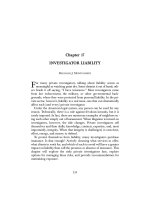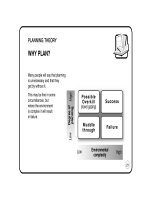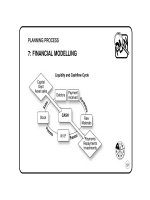Beginners'''' Guide to Ecommerce By June Campbell pot
Bạn đang xem bản rút gọn của tài liệu. Xem và tải ngay bản đầy đủ của tài liệu tại đây (529.45 KB, 75 trang )
What you Need To
Know to Accept
Payments from
Your Web Site!
© Nightcats Multimedia Productions 2001
Beginners' Guide to
Ecommerce
By June Campbell
Hello! Thank you for using Beginners'
Guide to
Ecommerce. You'll find the essential
information that you need so you can join
the rest of us who are selling goods and
services on the Internet.
Perhaps you are wondering if I am
qualified to give you this information. The
answer is "yes." As the owner of my own
writing business, Nightcats Multimedia
Productions, I have been selling
information products on the Internet since
April, 1998. I process credit card
transactions from Visa, Mastercard,
Discovery and American Express.
Through experience, I have learned
several lessons about operating an online
store. However, not all of the knowledge
in this ebook is my own I have
incorporated recommendations and
suggestions from other merchants who
have found a way to sell their goods over
the Net.
Please feel free to distribute this
ebook to friends, colleagues or others. If
you wish, give it away as a free gift to
visitors to your site or subscribers to your
ezine. I ask only that my copyright
information be observed and that the
ebook not be sold for profit.
Please visit me visit me on the web
for articles, guidebooks, how-to's and a
FREE gift when you subscribe to my bi-
weekly ezine: The Roundup for people
interested in doing business!
Nightcats Multimedia Productions
Table of Contents
Table of
Contents 3
Introduction 4
Accepting Credit Card
Transactions 5
Merchant
Accounts 5
About
Chargebacks 6
High Risk
Processors 6
Internet Merchant Account
7
Credit Card Processing
Services 7
Setting Up: The
Technology 9
Shopping
Carts 10
Ecommerce: The Dark
Side 11
Credit Card Fraud:
11
Internet
Shoplifting 11
Piracy
12
Tips for Protecting Yourself Against
Online Credit Card
Fraud 12
Alternative Ecommerce
Methods 13
Telephone Billing
Services 13
Electronic Payment
Systems 14
Person to Person Technologies
(P2P) 14
One Stop
Shops 15
International Merchants
15
Definitions 17
Beyond
Ecommerce 18
The Promote-Ivator Your Desktop
Coach and
Mentor!
Receive constant encouragement!
Plan and track your marketing
campaigns!
Network with Internet Marketing
Gurus!
At $6.00 a year, and money back if not
satisfied, what's to lose?
/>Introduction
You have something you want to sell
on the Internet. Maybe it's a book, or a CD
or a piece of software you wrote. You are
in luck. The time has never been better.
Internet shopping has become a
mainstream activity. Increasing numbers
of people are willing to open the wallet to
purchase items or services over the Net.
"But," you say, "How do I collect the
money from the customer?"
Good question. There are several
methods of collecting monies from online
sales. Many online merchants offer 2-3
choices of payment methods so customers
will have options.
1. First, you can ask online customers
t o send you a check. When the check
arrives and clears the bank, you deliver
the product. If this is your only method of
transacting a sale, you will lose many,
many customers. The Internet is based on
impulse buying. Very few people will go
to effort of writing and mailing a check,
and then wait several weeks for delivery.
Most merchants offer this option to
accommodate people who do not have
credit cards.
2. Persons who are already accepting
credit card transactions for products or
services they sell offline can ask web
customers to phone or fax you with their
credit card information. Then, you can
process the transaction manually. Please
avoid asking people to email you their
credit card information. Almost everyone
knows that email is insecure and this
request will damage your credibility in the
eyes of potential customers. If you opt for
the phone method, be prepared to handle
calls 24/7. The Internet is a global
community and people expect to shop at
their convenience.
You will attract more sales if you
provide an 800 number. However, be
aware that 800 numbers are not globally
accessible. You risk losing international
sales if this is your only method of
transacting payments.
Asking customers to phone in their
credit information will generate more
sales than asking for checks. However,
your sales will be increase considerably
if you provide a means for customers to
make their payments online.
3. You can accept credit card
transactions online over secure lines.
Internet merchants indicate that this
method is the single most effective means
of conducting transactions. Without the
ability to process credit cards, your online
sales will be a fraction of what they could
be. More about this later.
4. You can use alternative methods of
accepting online payment. There are
several alternative technologies available.
Each comes with its own strengths and
weaknesses. Your choice will depend
upon your individual situation. More later.
Accepting Credit Card
Transactions
It's worth mentioning again. Your
sales will increase dramatically when you
offer your customers the ability to pay by
credit card transaction. Those of you who
already accept credit cards in your offline
businesses can skip this section.
Credit card transaction is a big topic.
For simplicity's sake, let's break it down
into three categories: Merchant Accounts,
Internet Merchant Accounts and Credit
Card Processing Services.
Merchant Accounts
A Merchant Account is a relationship
between a business (i.e. a merchant) and
a merchant bank that allows the merchant
to accept credit card payments from
customers.
Acquiring a Merchant Account can be
difficult. Many banks or financial
institutions have stiff requirements and
regulations regarding the issuing of a
merchant account. The situation will differ
depending on your bank, your country's
banking regulations and your individual
situation. Many a merchant has
approached their bank to discuss a
merchant account only to discover that the
friendly banker becomes less friendly.
These accounts are often beyond the
means of people who are operating small
or new businesses.
When you apply for a merchant
account at your bank, you will be required
to demonstrate that your business has had
an extended period of financial stability.
Expect to present your business plan, your
financial statements and various other
documents. Factors considered include
cash reserves, the length of time you have
been in business, your tax returns, your
credit history, debt load, refund policies,
volume of business, cost of item being
sold and other sources of income. Those
who pass the stringent requirements might
be asked to put up a substantial sum of
money (several thousand dollars) as a
safeguard against chargebacks or credit
card fraud. They could also be asked to
pay for the software or terminals that they
will be using. More about chargebacks
later.
Those who are eligible for a Merchant
Account will need the necessary hardware
or software. In some cases, depending on
the bank and depending on the type of
business that you are operating, you will
need to purchase or rent a processing
terminal the equipment that merchants
run your credit card across when you
charge a transaction. You might also need
to acquire special software.
Before getting your merchant account,
be sure to find out the full charges that you
will incur for using the service. In
addition to the aforementioned chargeback
deposit, investigate hidden equipment
costs, setup fees, line charges, bank
transaction fees and credit card discount
rates. These costs eat away from your
profits, and you will need to price
accordingly
Also, be aware that most banks allow you
to process one credit card only.
About Chargebacks
All major credit card companies offer
their cardholders the right to contest
charges on their statements that may be the
result of theft, fraud or error.
A customer contacts his/her credit
card company and complains that the
merchandise was unsatisfactory, did not
arrive as promised, or that the sale
resulted as a result of a lost or stolen card.
These contested charges are called
chargebacks. When a chargeback occurs,
the merchant will end up reimbursing the
issuing bank the amount of the purchase
price, in addition to a chargeback fee
that can be as high as $50 or more. For
example, if you sell a book for $20
through a credit card transaction and the
cardholder later contests the sale, you will
end up paying your bank the $20 PLUS a
chargeback fee of $10 to $50 dollars.
When you add to this the amount that the
book cost you and the cost of mailing, if
applicable, you can see that your losses
can be add up quickly.
Banks ask for a sizable deposit to
protect themselves in the event that the
merchant is unable to cover the
chargeback costs at the time they occur.
Merchants who incur too many
chargebacks are at risk of losing their
merchant account. Somewhere between 1-
3% of total transactions is usually
acceptable.
Chargeback issues are of foremost
concern to a merchant hoping to acquire a
merchant account. They can result in
serious financial loss.
Note that chargebacks are not the same
as the fee you pay for a merchant-issued
refund. The latter might cost you only a
few dollars to process.
High Risk Processors
Since so many small businesses are
unable to arrange Merchant Accounts, an
industry has arisen to meet the need. High-
risk processors are financial institutions
or companies that that issue merchant
status accounts to high-risk businesses. In
this case, a high-risk business is one that
cannot arrange a Merchant Account
through the bank. These companies offset
their risks by charging higher transaction
fees and higher rates than the banking
institutions. However, the initial outlay of
cash that you will be asked to put up is
usually much less than the large deposits
that the banks require. Some high risk
processors might offer other added
features such as shopping cart software,
web site templates, forms or secure lines
for ordering.
Many companies offer this service.
Most are available only to US residents,
and terms of service vary. Read the fine
print on the contract and be sure you know
all of the hidden charges that might apply.
Card Service International
( and
Electronic Transfer Inc
( are
arguably two of the best-known
companies of this type in the US.
However, merchants who live outside the
US may encounter difficulties. Refer to the
section on International Merchants.
Internet Merchant Account
An Internet Merchant Account is a
special account that permits the
acceptance of credit cards over the
Internet. Transactions are processed
online, in real time. While the customer
waits, the system checks the credit card to
be sure that it has not been reported
stolen, has not expired, and is listed to the
same address that the customer has
provided. If the card is approved, both
customer and merchant are notified that
the sale has transpired. This type of
account is a stricter banking relationship
than one involving face-to-face
transactions. Web transactions do not
gather signatures from purchasers and
therefore there is a higher risk of fraud.
This method of accepting payment is
the #1 most important ecommerce method
you can offer your customers. Without it,
your sales will be much less than need be.









